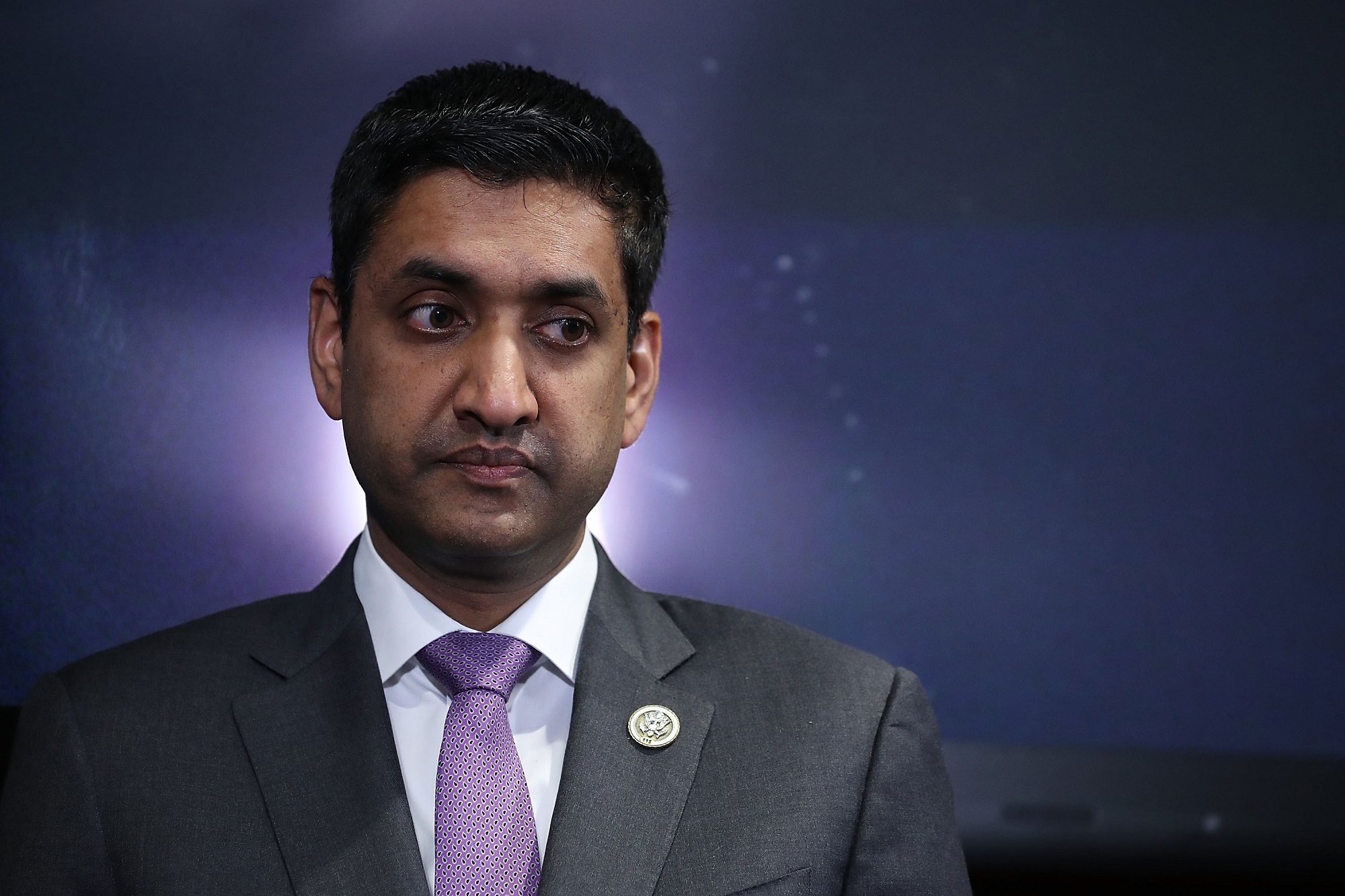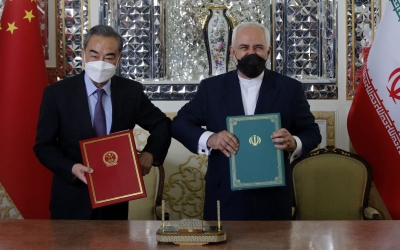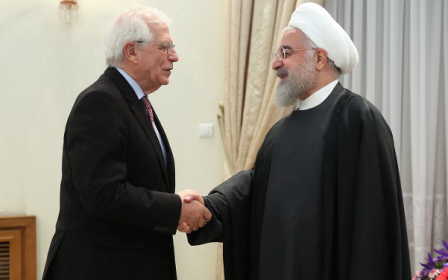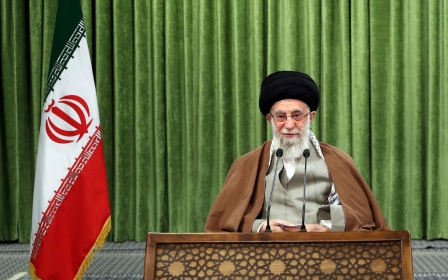'Disappointing start': US progressive Ro Khanna criticises Biden's Iran policy

Progressive US Congressman Ro Khana criticised the Biden administration's approach to Iran, decrying what he called a lack of "transformative imagination" in foreign policy as he urged the White House to lift sanctions on Tehran in order to revive the nuclear deal.
Speaking at a virtual event organised by groups advocating for the reimplementation of the nuclear agreement, Khanna said on Wednesday that the "status quo" of the maximum pressure campaign established by former President Donald Trump remains in place.
"Let's just speak plainly; it has been a disappointing start when it comes to Iran policy from the administration. They should have been already trying to get into this deal," Khanna said.
'It has been a disappointing start when it comes to Iran policy from the administration'
- Congressman Ro Khanna
As a candidate, President Joe Biden had vowed to return to the nuclear pact, known as the Joint Comprehensive Plan of Action (JCPOA), which saw Iran scale back its nuclear programme in exchange for lifting sanctions against its economy.
But efforts to reimplement the deal have been complicated by the failure to sequence a return to compliance by Washington and Tehran.
New MEE newsletter: Jerusalem Dispatch
Sign up to get the latest insights and analysis on Israel-Palestine, alongside Turkey Unpacked and other MEE newsletters
In 2018, Trump nixed the multilateral agreement and started piling sanctions on Iranian industries, banks and businesses. In response, Iran has been loosening its commitments to the accord and enriching uranium beyond the limits set by the agreement.
Advocacy campaign
Iran says sanctions should be lifted as a first step to revive the agreement because the US is the party that withdrew from the accord. The Biden administration initially called on Iran to return to full compliance before sanctions are lifted, but now American diplomats are calling for talks with Tehran to work out a return to the deal.
Meanwhile, Biden is facing pressure domestically, including from hawkish members of the Democratic Party, to address Iran's ballistic missile programme and regional activities in any future agreement.
Biden and his top aides say they would like to revive the deal and then try to strengthen and lengthen it and use it as a platform to tackle other issues with Tehran.
On Wednesday, Khanna said Trump's maximum pressure was a "colossal failure", as evidenced by Iran's growing stockpile of nuclear material.
"And yet, there is a continuation basically of the status quo and dragging of the feet - a lack of transformative imagination that we see in domestic policy," Khanna said.
"So I think we have to continue to make a very simple case: that we have to try to get back into the JCPOA by getting back into the JCPOA, not playing a game of chicken. There is no downside, you can always snap back the sanctions. If there's cheating, you can always get back into the status quo."
Progressives had hailed some of Biden's domestic policies, including the coronavirus relief package, infrastructure plans and environmental initiatives. But the administration's continued unconditional support for Israel, commitment to the alliance with Saudi Arabia and failure to return to the JCPOA have irked activists in the left-wing of the Democratic Party.
Wednesday's event was part of a week-long advocacy campaign, dubbed #ReSealTheDeal, by pro-diplomacy groups in favour of the JCPOA.
On Tuesday, supporters of the agreement used the hashtag on social media to urge a return to the agreement.
"Saving the JCPOA is imperative to advancing global peace & security," Congresswoman Barbara Lee wrote on Twitter. "We should move quickly to return to the JCPOA. #ReSealTheDeal."
With the Iranian presidential election set to take place in June, advocates for a swift return to the JCPOA fear that the window of opportunity to reimplement the agreement is closing.
"Every passing day that the US and Iran do not #ReSealTheDeal cements Donald Trump’s legacy and resigns us to his dangerous vision for the US role in the world," Jamal Abdi, president of the National Iranian American Council, wrote on Twitter.
'Compliance for compliance'
At Wednesday's event, Democratic Senator Chris Murphy, a leading anti-war voice in Congress, said he had urged the administration publicly and privately to return to the deal.
"I have counselled the administration to adopt a compliance-for-compliance approach, to be open and willing to take early steps back into the deal," Murphy said.
"My feeling is that if we were to do this, and the Iranians weren't to reciprocate, we would be in a much better position to take action in a multilateral way with the P5+1."
The P5+1 are the original signatories of the JCPOA, the five permanent members of the UN Security Council - the US, UK, France, Russia and China - plus Germany.
Murphy said a "thin silver lining" from Trump's maximum pressure campaign has been discrediting arguments against the JCPOA that argued that unilateral sanctions would solve issues with Iran.
The senator said Iran did not stop its involvement in Iraq, assistance for Hezbollah and support for the Houthis despite the sanctions.
"All of it continued. Their nuclear research program was restarted. Maximum pressure was a miserable 100-percent failure," Murphy said.
Still, hawks in Congress, including some Democrats, are voicing scepticism of the nuclear deal.
Last week, 14 Democrats joined 28 Republicans in signing a letter urging the administration to adopt policies that would prevent Iran from obtaining a nuclear weapon and constrain Tehran's "destabilizing activity throughout the Middle East and its ballistic missile program."
The letter, backed by the pro-Israel lobby AIPAC, was led by senators Bob Menendez, the chair of the Foreign Relations Committee, and Lindsey Graham, a staunch Trump ally.
Iranian officials have categorically ruled out expanding the nuclear agreement. Tehran has been calling for unconditional sanctions relief, which it says it would immediately reciprocate by returning to compliance with the deal.
"Today, the ball is firmly in the US court. If it claims interest in the JCPOA, it must abandon its unlawful violations and verifiably remove all sanctions imposed, re-imposed and re-labeled since January 20, 2017," the Iranian foreign ministry said in a statement last week.
"Iran will stop all of its remedial measures upon verification of a US return to compliance."
Middle East Eye delivers independent and unrivalled coverage and analysis of the Middle East, North Africa and beyond. To learn more about republishing this content and the associated fees, please fill out this form. More about MEE can be found here.





